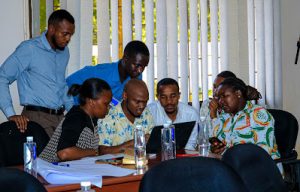To ensure that research conducted by researchers from the Sokoine University of Agriculture (SUA) and other institutions is beneficial to society, the University, through the Climate Change Adaptation and Resilience in Tropical Drylands (CLARITY) Research Project, has provided training to young researchers, including SUA students, on how to collect and process data to produce quality research.

Speaking to SUA Media on January 16, 2025 about the two-day training being held at SUA, the CLARITY Project Lead Prof. Japhet Kashaigili who is also the Director of the Directorate of Postgraduate, Research, Technology Transfer and Technical Advisory at SUA said it is of great importance for young researchers to know the methods of collecting data in an appropriate manner and processing it to have the expected benefits.

“It is a period when our researchers and students at SUA are in the data collection period, now we said before they start or while they continue to collect data, let’s build their capacity so that they can know the best methods of collecting data, for example, you have collected data now start processing it, how do you process it, what methods do you process it using, what do you get, for whose benefit, basically those are our goals, that is why the training is provided in theory and practice”, said Prof. Kashaigili.

And Prof. Kim Abel Kayunze from the Department of Development Studies and Strategic Studies at SUA, who is among the facilitators in the training, said that this is a participatory research training and encouraged participants to pay attention to what they are being taught along with reading books and journals that have been cited during the training so that they can gain in-depth expertise that will help them conduct research that will solve social challenges.

For his part, a participant in the training, Mbonea Joshua Mweta from the Department of Forestry Engineering and Forest Product Sciences at SUA, who is also a Master’s student, said that the training has come at the right time because they need to be great researchers and they cannot be researchers if they do not know how to collect data and process it. “I believe this training will help me greatly.”

Assistant Researcher from the Tanzania Livestock Research Institute (TALIRI) Bertha Manga, who is a Master’s degree student in Rural Development at SUA, said the knowledge she gained from the training is very important for the future of her studies as well as the work she does since she is already a researcher.

+

